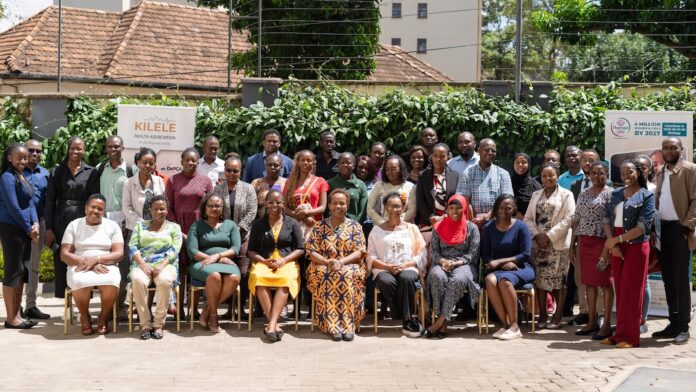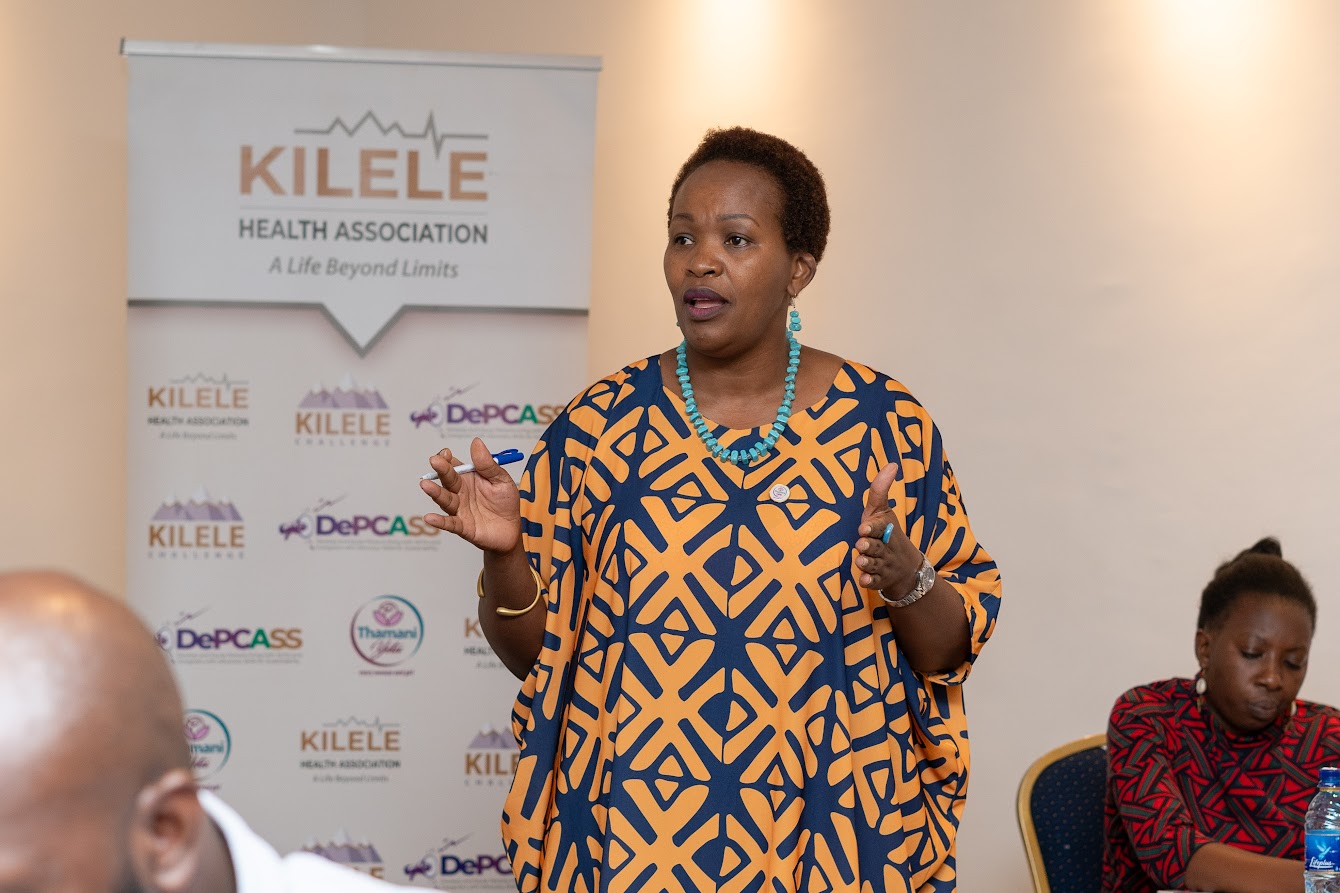
By Henry Owino
Nairobi, Kenya: Despite the success of cancer diagnoses and treatment, the majority, including well-informed and educated individuals, continue to believe in myths surrounding cancer. It is important for the public to be aware of the common myths about cancer to ensure that misinformation does not hinder them from seeking advice from a medical expert.
Dr Mary Wangai a Health Technical Advisor at Kilele Health Association advises the public especially women to regularly screen for cancer to thwart its progression or late discovery. She says cancer is a disease that has symptoms, detectable, preventable, treatable, and so on but not a death sentence as alleged by social media.
Dr Wangai regrets that misinformation and misconception compounded with cultural myths and religious beliefs have been awash in the new media. Social media platforms are misleading the public causing more harm to cancer patients and families who are struggling to win the disease.
However, Dr Wangai says all is not lost as journalists and the media fraternity have the power to debunk fake news spread about cancer using the most trusted traditional media platforms. Professional Science Journalists especially in vernacular media stations are therefore tasked to demystify the fake news by disseminating verified and accurate information to save society.
“For instance; cervical cancer is caused by persistent infection with one or more of the high-risk types of the Human Papilloma Virus (HPV). The virus is sexually transmitted among men and women and infects the cells of the opening of the womb also known as cervix hence referred to as cervical cancer,” Dr Wangai explains.
There is no connection between cervical cancer and witchcraft or dark forces acting remotely on an individual health in the family in order to destabilize them physically, emotionally, and socially, and drain their financial resources. Scientifically, this is not possible and has not been proven anywhere even by traditionists.
Demystifying Misconceptions and Myths
On the other hand, Dr. Andrew Odhiambo, who is a Consultant Physician & Medical Oncologist in one of the leading hospitals in Kenya, demystifies some of the misconceptions and myths that many Kenyans have come to believe over time as they are popular ideas on how cancer begins, grows and how it spreads.
Although many of these may be scientifically incorrect, they always seem to make sense to the common man ‘’mwananchi’’ because they are rooted in very old and outdated theories and beliefs.
These wrong ideas often lead to wrong perceptions, and unnecessary worry and even hinder proper diagnosis, treatment, and prevention of many cancers.
“As one of the very few oncologists in Kenya, I sometimes struggle and feel bad when I see misinformed Kenyans stand by these beliefs and end up compromising their care. These views are my personal stand on some of these myths and misconceptions about cancer in Kenya. So, I hope to shed light on some of the scientific evidence-based information out there about these myths and misconceptions,” Dr Odhiambo regrettably explains.

Cancer Is A Death Sentence: Cancer is not a death sentence. I have walked the journey with many cancer patients and not all of them have had to die. Today, over 40,000 new cases of cancer are diagnosed in Kenya. 27,000 of these will die within the same year. Cancer indeed kills many Kenyans, but there are those who live. The probability of dying from cancer is higher in African countries because of poverty, late diagnosis, and inadequate cancer care. Different cancers behave differently.
The stage at which one is diagnosed with cancer will in most instances determine how long he/she will live. The majority of cancers that are caught early are curable. What determines whether a patient dies or lives from cancer depends on several factors like the type of cancer, whether it is fast or slow growing, whether it has spread to other parts of the body or not, and whether effective treatment is available for these cancers as well as the patient’s overall state of health and more.
There are certain cancers like cancer of the brain and certain blood system cancers that are very deadly whereas their certain cancers that people can live with for over 20-30 years and die from other causes.
Cancer Is Contagious: Generally, the answer to this is no. Cancer is not contagious because it does not spread from one person to another. The only known way cancer can spread from one person to another is through organ transplantation. Organ transplantation is very not common in Kenya other than kidney transplants and it is a general rule that patients with cancer are not considered to be donors for such procedures. So, it is not possible for you to transmit cancer to somebody else by touching them, through sex, or through sharing beds or utensils.
Having said that, there are certain risk factors that may be transmissible from one person to another. The best example is the human papillomavirus (HPV) which is responsible for cervical cancer as well as cancers affecting the oral cavity and the anus.
Eating Sugar Makes Cancer Grow: Dr Odhiambo doesn’t believe in this. Although research may have shown that cancer cells feed on sugar more than normal cells, there have been no well-conducted scientific studies to date that have proven this association. There are over 100 different types of cancer and each of them behaves differently from one another.
It is not true that eating sugar will make your cancer worse. Stopping or reducing sugar doesn’t mean that your cancer may shrink or even disappear. The only link between high sugar and cancer is that high sugar diets may promote obesity and overweight which may be linked to several types of cancers particularly cancer of the kidney, uterus, colon ovary, and prostate just to mention but a few.
Tumour Biopsy or Cancer Surgery Makes Cancer Spread: The truth is that the real chance of cancer spreading due to surgery or biopsy is extremely low. You need a skilled surgeon who carries out careful procedures and makes sure that he doesn’t spill cancer cells from one part of the body to another. To date, the most effective treatment for any solid tumor is surgery.
The only way of making an accurate diagnosis of cancer is through getting a biopsy. If your surgery is done carelessly and certain organs for example the gall bladder and other internal organs are exposed during surgery then there might be a remote chance that the cancer might be spread but as a general rule the rate of this spread is extremely low.
The reason many Kenyans believe that this is true is that many times patients may succumb a few weeks or months after surgery and they believe that is usually linked to the surgery when in a real sense the death of these patients may have as well occurred with or without the surgery.
All Cancer Chemotherapy Makes Hair Fall Off: This is not true. Whereas most chemotherapies used for common cancers like breast and cervical cancer may cause hair to fall off. There are certain newer types of chemotherapies that doctors use for colon cancer and most recently the targeted agency immunotherapy is not associated with hair loss or falling.
Mobile Phones Cause Cancer: According to Dr Odhiambo’s experience and best of his knowledge, there has been no well-conducted studies so far that have proven this myth. There are several small studies may have shown this association, but it is not proven to date that cell phones may cause genetic mutation or even damage the genes. Cell phones have not been shown to cause any significant damage to the human gene.
Antiperspirant Deodorants Cause Breast Cancer: The answer is no. To the best of Dr Odhiambo’s knowledge, most of the well-conducted studies have not found any strong link to show that the chemical found in these substances causes any cancerous changes in the breast.
There Are Herbal Products That Cure Cancer: The straight answer is no. Though there may have been studies that suggest that some of the alternative therapies including some herbs can cure certain cancers or even alleviate the side effects of treatments. There have been no well-conducted randomized controlled trials that have shown that herbal treatments are effective in treating cancer.
In fact, some herbal products cause damage to the liver and other internal organs and may even interrupt chemotherapy and radiotherapy and cause more harm to patients. Patients are encouraged to tell their doctors what supplements or herbs they are taking so that doctors can be able to plan their treatment effectively and avoid unnecessary damage.
If Someone In My Family Has Cancer, Then I Am Likely To Get It: Not necessarily. Many Kenyans imagine that genetic disorders are always transmitted from one member of the family to another. The truth is only 5-10% of most cancers are actually inherited from one’s parents. In families where inherited genetic mutations are found many family members, often develop the same type of cancers and these cancers are usually termed as family or hereditary. And even if these hereditary cancers may be found in the family it doesn’t necessarily mean that they are familial. The majority of cancers are caused by sporadic mutations which are acquired throughout one life and these mutations are random and are usually associated with environmental factors such as tobacco smoke, radiation, and other chemical exposure.
If No One In My Family Has Ever Had Cancer, Then I Will Not Get It And My Risk Is Low: Actually, the answer is no, 40-50% of all cancers oncologists are not able to find a link in the family, and truth be told, most of the time doctors are not able to find a single attributable risk factor to a person’s cancer. A case in point is breast cancer. Where 2 out of 3 women are diagnosed with breast cancer nowadays, oncologists are not able to identify any of the traditional risk factors that are known.
So, the fact that no one in your family has cancer, doesn’t necessarily mean you cannot get cancer and doesn’t mean that your risk is low. Where applicable, doctors encourage screening for all patients. Information is power. Ignorance only feeds more fear and stigma.













